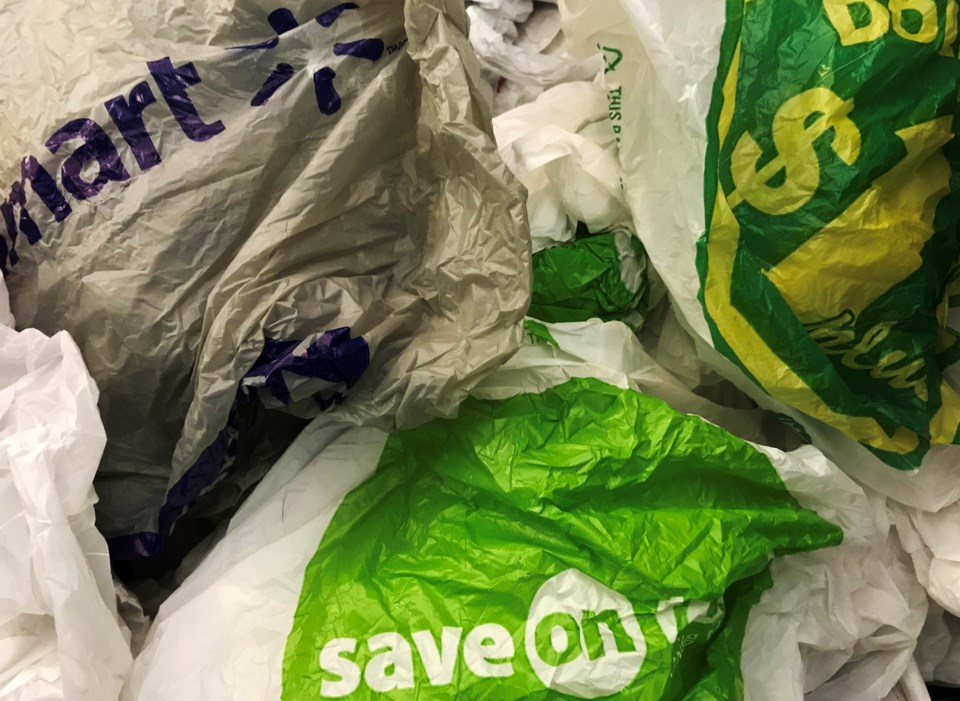Delta businesses are largely accepting the new ban on single-use check out plastic bags, although there have been a handful of complaints about the change, says the city’s manager of climate action and environment.
The bylaw went into effect June 6 and bans single-use plastic bags for carry-out purposes, with a few exceptions.
Instead, customers who want or need a bag and who haven’t brought their own, will have to pay 25 cents for a paper bag or $2 for a reusable bag.
The city sent out about 500 letters to local businesses and received about 30 responses or questions, including a handful of complaints, said Mike Brotherston.
“There’s been a mix of questions and a few complaints,” he said Monday. “Probably the most common question is why do businesses have to charge their customers for paper or reusable bags?”
However, provincial law requires that there be a charge, Brotherston said. The charge is also incentive for people to bring their own bags and also allows cost recovery for the businesses.
Jill McKnight, executive director for the Delta Chamber of Commerce, said she hasn’t heard many complaints, but one chamber member wanted to know if the PST had to be charged on the 25-cent paper bag fee. And after review, it was found PST is applicable.
She’s not sure if many businesses are aware of that and it could mean they’ll have to pay PST, and even possibly GST, on the paper bags, at tax time. That concern has been passed on to the city.
“From a practical application, I think it would be valuable if the cost was 25 cents, including tax,” she said.
Brotherston confirmed that PST is applicable but that it’s up to each business how it deals with it. Businesses can also increase the cost of the bags.
The bylaw bans using Styrofoam cups, plates, dishes and containers for food take out, but restaurants are already shifting to plastic containers which are recyclable, or compostable cardboard, added Brotherston.
The new bylaw still allows the use of plastic bags for meat, frozen foods, prepared foods and bulk items, prescription drugs, printed materials and linen and laundry.
The transition has gone well, said Brotherston, who noted that council’s direction is to continue the transition period for another half year, with an emphasis on education and no enforcement.
However, paper bags are more expensive and they require more storage space, said McKnight, who also owns South Coast Casuals in Ladner Village.
“The bags are going to cost us more money than we’re taking in or that we were paying previously,” she added.
It’s also more difficult to order paper bags in bulk in order to save that way.
Many stores have posted notices about the new bylaw and ask customers if they want a paper bag for a 25-cent charge.
“We’ve seen an uptick in people remembering to bring in bags,” McKnight said.
At Joe’s Farm Market in Tsawwassen, manager Ben Liu also notes that paper bags are more expensive than plastic.
“It’s an adjustment,” but most customers have accepted the change, he added.
It’s been a similar, smooth adaptation at Jarry’s Market in Ladner Harbour Centre.
“I have no issues at all. Everybody has transitioned nicely,” said manager Blair Beaton.
People knew about the coming ban a year ago, he said. And the store isn’t selling that many paper bags anyways. If there are spare cardboard boxes, customers can cart away their groceries in those. Many bring in their own re-usable bags. Clerks also tell customers there’s a 25-cent charge for a paper bag before they choose that option.
“Even when the transition first happened, there was very little upset,” Beaton said.
Delta council passed the Plastic and Single Use Items bylaw last November, with a six-month education and awareness phase followed by a further six-month grace period, after which staff will report back to council, prior to any enforcement. If council directs staff to start enforcement, an educational approach still will be a priority followed, if necessary, by a fine of $200 that could be levied for a number of offences.
The B.C. government a year ago, gave cities authority to ban plastic bags without provincial approval.



